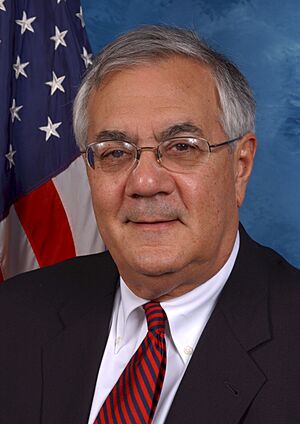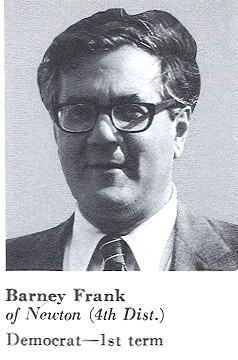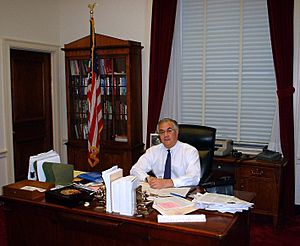Barney Frank facts for kids
Quick facts for kids
Barney Frank
|
|
|---|---|
 |
|
| Member of the U.S. House of Representatives from Massachusetts's 4th district |
|
| In office January 3, 1981 – January 3, 2013 |
|
| Preceded by | Robert Drinan |
| Succeeded by | Joe Kennedy III |
| Ranking Member of the House Financial Services Committee | |
| In office January 3, 2011 – January 3, 2013 |
|
| Preceded by | Spencer Bachus |
| Succeeded by | Maxine Waters |
| In office January 3, 2003 – January 3, 2007 |
|
| Preceded by | John LaFalce |
| Succeeded by | Spencer Bachus |
| Chair of the House Financial Services Committee | |
| In office January 4, 2007 – January 3, 2011 |
|
| Preceded by | Mike Oxley |
| Succeeded by | Spencer Bachus |
| Member of the Massachusetts House of Representatives | |
| In office January 3, 1973 – January 3, 1981 |
|
| Preceded by | Eliot Wadsworth |
| Succeeded by | Thomas Vallely |
| Constituency | 5th Suffolk (1973–1979) 8th Suffolk (1979–1981) |
| Personal details | |
| Born |
Barnett Frank
March 31, 1940 Bayonne, New Jersey, U.S. |
| Political party | Democratic |
| Spouse |
Jim Ready
(m. 2012) |
| Education | Harvard University (BA, JD) |
Barnett "Barney" Frank (born March 31, 1940) is a retired American politician. He was a member of the U.S. House of Representatives for Massachusetts from 1981 to 2013. As a member of the Democratic Party, Frank was the chairman of the House Financial Services Committee. This committee deals with the country's money and banking systems.
He was a main sponsor of the Dodd–Frank Act in 2010. This important law changed the rules for banks to protect the U.S. economy. During his time in Congress, Frank was known as a prominent gay politician. In 1987, he became the first member of Congress to voluntarily share that he was gay. In 2012, he became the first member of Congress to marry someone of the same sex while in office.
Contents
Early Life and Education
Barney Frank was born in Bayonne, New Jersey. His family was Jewish, and his grandparents came to the U.S. from Poland and Russia. His father ran a truck stop in Jersey City. Frank went to Bayonne High School and later attended Harvard College.
After his father passed away, Frank took a year off from his studies to help his family. He graduated from Harvard in 1962. In 1964, he volunteered in Mississippi during Freedom Summer, a project to help African Americans register to vote. He later earned a law degree from Harvard Law School in 1977 while he was already working in government.
Political Career
Before joining the U.S. Congress, Frank worked as an aide for Boston's mayor, Kevin White, and for Congressman Michael J. Harrington.
Massachusetts State Representative
In 1972, Frank was elected to the Massachusetts House of Representatives. He served there for eight years. During this time, he also taught part-time at several universities, including Boston University and Harvard's John F. Kennedy School of Government.
U.S. House of Representatives
In 1980, Frank was elected to the U.S. House of Representatives. He won his first election with 52% of the vote. After the districts were redrawn in 1982, he had to run against another experienced politician, Margaret Heckler. Frank won that election with 60% of the vote.
For the rest of his career, Frank was re-elected easily every two years. He often won with very large majorities. From 2007 to 2011, when the Democrats controlled the House, he was the chairman of the powerful House Financial Services Committee.
In November 2011, Frank announced that he would not run for re-election in 2012. He was succeeded by fellow Democrat Joe Kennedy III.
Major Laws and Policies
Frank was known for being a very smart and witty debater in Congress. A survey of people working in Congress once named him the "brainiest," "funniest," and "most eloquent" member of the House.
Financial Reform
Frank played a key role in the government's response to the 2008 financial crisis. He believed that more rules were needed to prevent banks from taking big risks that could harm the economy. He worked with both Democrats and Republicans to pass new laws.
The most famous law he helped create was the Dodd–Frank Act of 2010. This act created new government agencies to watch over the financial system. It also aimed to protect consumers from unfair practices by banks and lenders.
Frank also worked on laws to help homeowners who were in danger of losing their homes during the crisis. He supported the American Housing Rescue & Foreclosure Prevention Act of 2008.
Civil Rights
Frank was a strong supporter of civil rights for all people. He supported equal rights for women and helped pass laws to protect people from hate crimes. In 1987, he was a major supporter of a law that gave reparations, or payments, to Japanese Americans who were forced into camps during World War II.
He was also a leading voice for the rights of lesbian, gay, bisexual, and transgender (LGBT) people. He supported allowing LGBT individuals to serve in the military and to have the same rights as other citizens.
Life After Congress
After retiring from Congress in 2013, Frank has remained active. He wrote an autobiography called A Life in Politics from the Great Society to Same-Sex Marriage, which was published in 2015.
In 2015, he joined the board of directors of Signature Bank, a bank based in New York. He sometimes appears on television to talk about politics and finance. In 2022, he was present in the House of Representatives to watch the final vote on the Respect for Marriage Act, a law protecting same-sex marriages.
Personal Life
Frank lives in Newton, Massachusetts. In 2012, he married his long-time partner, Jim Ready. His sister, Ann Lewis, was a senior adviser for Hillary Clinton's 2008 presidential campaign.
Frank has said that while he was raised in the Jewish faith and identifies with the Jewish community, he has his own personal beliefs about religion.
Electoral history
| Year | Democrat | Votes | % | Republican | Votes | % | Third Party | Party | Votes | % | Third Party | Party | Votes | % | |||||
|---|---|---|---|---|---|---|---|---|---|---|---|---|---|---|---|---|---|---|---|
| 1980 | Barney Frank | 103,466 | 52% | Richard Jones | 95,898 | 48% | |||||||||||||
| 1982 | Barney Frank | 151,305 | 60% | Margaret Heckler | 82,804 | 40% | |||||||||||||
| 1984 | Barney Frank | 172,903 | 74% | Jim Forte | 60,121 | 26% | |||||||||||||
| 1986 | Barney Frank | 134,387 | 89% | No candidate | Thomas DeVisscher | Independent | 16,857 | 11% | |||||||||||
| 1988 | Barney Frank | 169,729 | 70% | Debra Tucker | 71,661 | 30% | |||||||||||||
| 1990 | Barney Frank | 143,473 | 66% | John Soto | 75,454 | 34% | |||||||||||||
| 1992 | Barney Frank | 182,633 | 68% | Edward McCormick | 70,665 | 26% | Luke Lumina | Independent Voters | 13,670 | 5% | Dennis Ingalls | Freedom for LaRouche | 2,797 | 1% | |||||
| 1994 | Barney Frank | 168,942 | 99% | No candidate | Others | 853 | 1% | ||||||||||||
| 1996 | Barney Frank | 183,844 | 72% | Jonathan Raymond | 72,701 | 28% | |||||||||||||
| 1998 | Barney Frank | 148,340 | 98% | No candidate | Others | 2,380 | 2% | ||||||||||||
| 2000 | Barney Frank | 200,638 | 75% | Martin Travis | 56,553 | 21% | David Euchner | Libertarian | 10,553 | 4% | |||||||||
| 2002 | Barney Frank | 166,125 | 99% | No candidate | Others | 1,691 | 1% | ||||||||||||
| 2004 | Barney Frank | 219,260 | 78% | No candidate | Charles Morse | Independent | 62,293 | 22% | |||||||||||
| 2006 | Barney Frank | 196,513 | 98% | No candidate | Others | 2,730 | 1% | ||||||||||||
| 2008 | Barney Frank | 203,032 | 68% | Earl Sholley | 75,571 | 25% | Susan Allen | Independent | 19,848 | 7% | |||||||||
| 2010 | Barney Frank | 126,194 | 54% | Sean Bielat | 101,517 | 43% | Susan Allen | Independent | 3,445 | 1% | Donald Jordan | Tax Revolt Independent | 2,873 | 1% |
Filmography
- Let's Get Frank (2003) by Bart Everly (executive produced by Jonathan Van Meter, co-produced by Ruth Rachel Anderson-Avraham), Library of Congress (LOC) Catalog
- Compared to What: The Improbable Journey of Barney Frank (2014) by Sheila Canavan and Michael Chandler, IMDb
See also
 In Spanish: Barney Frank para niños
In Spanish: Barney Frank para niños
- LGBT culture in Boston
- List of Jewish members of the United States Congress
- List of LGBT members of the United States Congress
- List of United States representatives expelled, censured, or reprimanded
 | Selma Burke |
 | Pauline Powell Burns |
 | Frederick J. Brown |
 | Robert Blackburn |



